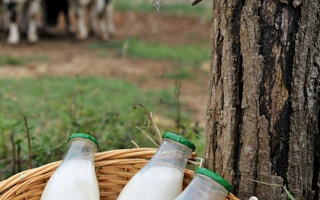Governments around the world, in recent years, have been intensifying efforts to address the burden of diseases on public health. In Singapore, there has been a major focus on diabetes, and efforts from policies to public education has been gaining traction in 2017. Key to getting Singaporeans healthier is raising the call to exercise more and eat better, but are Singaporeans heeding the call?
In a new study conducted earlier this year by applied nutrition expert, Dr Kalpana Bhaskaran, it is found that more education needs to be done to get adult Singaporeans more aware of their nutrition intake and how to get the best out of the foods they eat. The study in particular shows the need for more education around the role of milk in a balanced diet.
According to Health Promotion Board’s National Nutrition Survey 2010, 50 per cent of adult Singaporeans do not drink milk, and as a result are losing out on the nutritional benefits such as calcium, protein, multivitamins and minerals. A single serving of milk can provide as much calcium as 16 servings of spinach, or three tablespoons of anchovies. It comes as no surprise then that Singaporeans are falling short on critical nutrients such as protein and calcium.
“In a society where food is abundant and consumers are consuming more calories than before, this is particularly disconcerting,” said Dr Kalpana, who is Domain Lead for Applied Nutrition and Glycemic Index Research at Temasek Polytechnic.
The misperceptions of milk
Commissioned by FrieslandCampina Asia, the study titled Milk Perceptions – A Study of Milk Consumption Patterns in Singapore draws on published research and findings from a focus group study. The aim of the study is to gain better insight into the attitudes, beliefs and dairy consumption patterns of adult Singaporeans. It also identifies the gaps and solutions to improve the overall nutrition and health outcomes of Singaporeans. The study found that:
· Despite knowing the importance of milk for bone health, adult Singaporeans do not perceive milk to be important during adulthood. This places their bone health at risk as the calcium in bones needs to be replenished throughout life;
· Singaporeans are not aware of other benefits of milk, such as protein, Vitamins B, D, and A. This extends to an ignorance of the benefits of milk in reducing the onset of chronic diseases, including osteoporosis;
· Singaporeans severely overestimated the fat content in full cream milk (46 per cent as compared to the actual 4 per cent); many also incorrectly perceived that UHT milk is less nutritional than fresh milk.
· Non-milk drinkers do not drink milk as they dislike the taste of milk;
· Singaporeans do not consider milk to be an integral part of Singapore’s food culture, unlike in the West, where it is used regularly in cooking and/or consumed on its own; and
“The study provides interesting anecdotes from consumers, describing what motivates or prevents adult Singaporeans from changing their dietary intake of milk. Of note is the reluctance among non-milk drinkers to add milk or dairy to their diet even when presented with evidence of the health benefits of milk such as osteoporosis prevention,” said Dr Kalpana.
Nutrition education is key to improving health outcomes
The findings in the study emphasises the strong need to educate and encourage Singaporeans to be more proactive in caring for their diets and health. FrieslandCampina Asia is taking a first step in this direction by raising greater awareness of good nutrition through a new exercise and nutrition programme for preschools in Singapore called Nuture Kids. Nurture Kids was formulated in partnership with ActiveSG, Singapore’s national movement agency that promotes active lifestyles. The call to action is for preschool children to eat smart and get active.
“Encouraging good dietary habits, including the role of dairy and milk, and exercise from a young age is crucial,” said Hendro Poedjono, Corporate Affairs Director, Consumer Products Asia, FrieslandCampina. “Through the Nurture Kids programme, we hope to cultivate positive lifestyle behaviours in young children which will hopefully carry them through to their adult years,” he said.
Beyond the role of health awareness campaigns or specific policy interventions, it is worth reminding Singaporeans that the buck does stop with each of us. While no panacea can guarantee optimal health throughout life, it is ultimately up to the individual to take ownership of their health and well-being.
We owe it to ourselves to lead healthy lifestyles that are fortified by good nutrition. There is wisdom in the adage that ‘prevention is better than cure’.


















